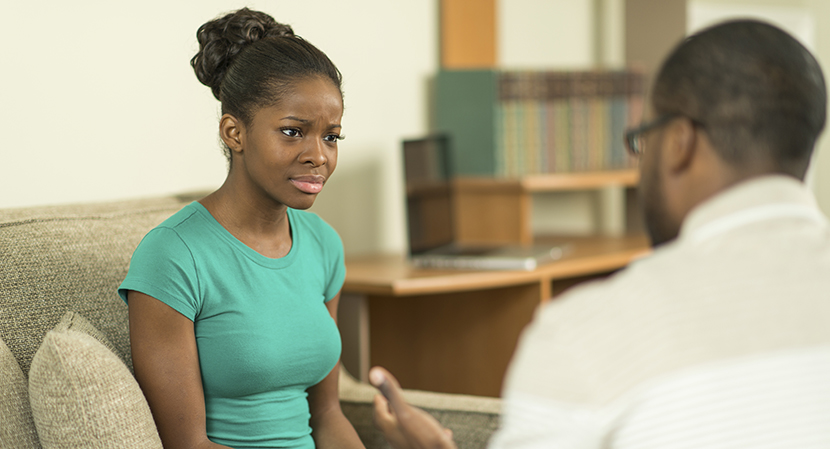Despite reports that life in America is getting better, the United States is experiencing a mental health crisis. Statistics show unemployment is the lowest it’s been since 1969, violent crime has fallen drastically in the last twenty years, and people are living longer lives, however, Bloomberg published data revealing there were 47,000 suicides and 1.4 million suicide attempts in 2017.
If American life is getting better, why are so many people suffering from anxiety and depression? Although it seems like a contradiction, the statistics aren’t in conflict. A person’s mental health doesn’t automatically improve when they live in a nice neighborhood, have a good job, and have money in the bank. Life in the U.S. might be getting better materially, but emotionally, it’s falling apart.
One look at social media reveals the staggering number of people who put on a mask to interact with the world. Many are trying to stay positive and look on the bright side, even when all they see is darkness. A large number of these people happen to be college students, who, despite having plenty of friends, often feel completely alone.
College students are heavily affected by the mental health crisis
College students across the U.S. are experiencing the effects of the nation’s mental health crisis perhaps more than anyone. While many students are dealing with their own depression and thoughts of suicide, others are coping with the loss of friends to suicide and violence on campus.
Suicides and violence on campuses have been increasing for years. During the 2001-2002 and 2015-2016 school years, 190 shootings involving college students left 167 killed and 270 wounded. Since the 2007 shooting at Virginia Tech, 198 people have been injured and 122 people have been killed on college campuses.
Why existing counseling efforts seem to fall short
Although statistics show that a number of students can’t function in college settings without extensive psychological support, not every suicidal college student will seek counseling. When students don’t seek help, their suicides give the appearance that counseling programs aren’t working.
Another factor is training counselors to handle the issues college students are facing. Today’s counselors need to be prepared to deal with issues they may not be familiar with, or issues that weren’t a main focus when they received their training.
For example, a college counselor who was trained thirty years ago probably didn’t get extensive training on how to help students with drug addiction. They may have received some training, but if drugs weren’t a huge problem back then, it would have been emphasized less.
Today’s counselors need specific training to address the issues college students are dealing with. That training needs to be readily accessible, consistent, and repeatable. Effective training also requires state-of-the-art technology rather than slapping together iPads, microphones, and monitors.
Cutting-edge video technology helps college counselors to be more effective
Decades ago, counselors received their training from observing and participating in live sessions with patients. Sometimes training sessions would include role playing. However, the majority of feedback came at the end of a real, live patient session.
Although video technology was available at that time, few clinicians videotaped sessions with patients. Today, video recording patient sessions is so common it’s hard to find a thriving practice that doesn’t at least record sessions with an iPad.
Recording counseling sessions provides several important benefits including:
- Better feedback. Student clinicians rely on feedback to make progress. Feedback is most effective when it’s detailed. Without a recorded session, a clinician needs to decipher their notes to provide feedback to students. This feedback method is decent, but having a video recording to pause and comment on with the student clinician is much better.
With a video recording, student clinicians don’t need to struggle to remember the interaction their trainer is commenting on. While they might remember general details about a counseling session, they’re not going to remember the entire session in every detail. A video recording makes it easy for a trainer to point out the interactions they want to address and the student doesn’t have to struggle to remember what they did. All they need to do is watch the replay. - Accurate skills assessment for clinicians in training. During a live training session with a real patient, the trainer running the session might be so engrossed in his or her work that they aren’t able to put their full attention on their trainee. Reviewing a video recording of the session helps trainers more accurately assess a student clinician’s skills.
- Ability to train groups of people at one time. Video recordings maximize the time required to train new counselors. Rather than training each new counselor individually, a video recording can be used to train a room full of new clinicians at one time.
Recorded sessions are also useful in clinical research. Recordings of at-risk students could be analyzed to identify subtle warning signs the counselor may have missed. The recording can then be used as a training tool to help new counselors spot these warning signs that could otherwise go unnoticed.
All the benefits listed above play a crucial role in improving the efficacy of college counseling programs, and our Video Audio Learning Tool (VALT) for counselor training takes these benefits one step further.
VALT can help college counselors and therapists reach more students
Colleges need effective therapists and being effective begins with the best training. Our VALT solution for clinical recording and observation is a reliable, secure, on or off-site solution for providing in-depth training to college counselors.
Several universities are already taking advantage of VALT including Texas Woman’s University, the University of Georgia, Temple University, Our Lady of The Lake University, and Mount Mercy University.
Learn more about VALT by requesting a demo today!
Click the link below to find out how the right audio/video capture solution enhances healthcare training and higher education.








